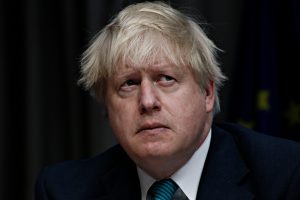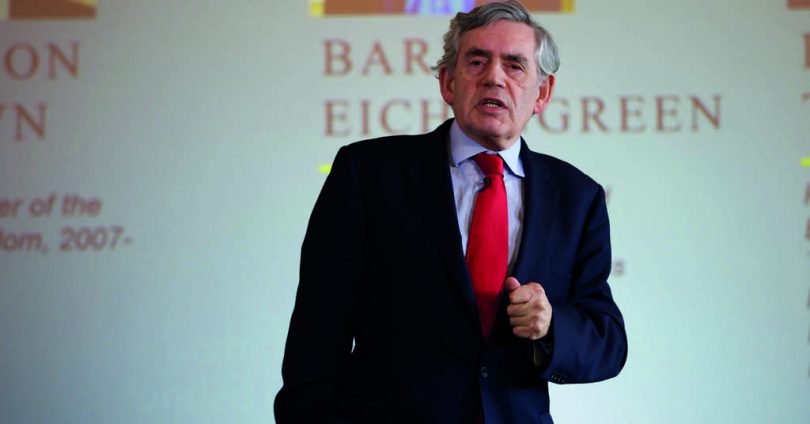Gordon Brown is never left without a media platform to put forward his increasingly odd views on Scotland’s future. He’s been banging on about what he describes as ‘’federalism’’ since before the first independence referendum without ever seeming to realise that such a system has never been put on the table by a Westminster government.
His most recent appearance at the Edinburgh Book Festival last weekend took the biscuit. In conversation with journalist and broadcaster Jonathan Freedland his dropped mistake after mistake in his latest broadside against Scottish independence.
It seems a dereliction of duty not to expose Gordon Brown’s nonsense for what it is. Let’s look at the main points.
1: Nationalism v patriotism
Gordon Brown said the Scottish government’s commitment to a second referendum is ‘’driven by nationalism rather than patriotism”. The proof? Mr Brown simply says: ‘’There’s no doubt about it’’. Unfortunately for the former Labour Prime Minister you need some actual evidence to back up statements like that.
He referred to George Orwell’s definition of patriotism as a ‘’positive love of country that required no hostility to others’’, whereas nationalism was ‘’antagonistic and divisive”. Mr Brown seemed oblivious to the fact those two words are better applied to a Westminster government that has pulled the UK out of Europe and adopted isolationist policies. He certainly could not give examples of the Scottish government’s ”antagonism” and promotion of ”division”. He made no reference to Scotland’s widely accepted civic nationalism. Like too many BBC commentators and Westminster politicians he seems unable to distinguish between the words ”national” and ”nationalist”.
2: ‘’More extreme’’ independence
Mr Brown said the type of independence proposed by the Scottish government today is ‘’more extreme’’ than in 2014 because it involved leaving the ‘’British customs union and the single market’’ and the adoption of a Scottish currency.
When it comes to currency Mr Brown seems to have forgotten that it was Westminster who tried to refute Scotland’s right to use the pound after independence
Both these claims are more than a bit rich. The first claim ignores the Westminster insistence on ‘’getting Brexit done’’ despite Scotland’s vote to remain in the EU. The only reason there is a need to address trade arrangements with the rest of the UK after a Yes vote is because Westminster made such a moger out of its post-Brexit trade ‘’deal’’ with Europe. In any case, it’s simply inconceivable that independence would not include a proper trade agreement between Scotland and the rest of the UK. No one seriously believes that it would be difficult.
When it comes to currency Mr Brown seems to have forgotten that it was Westminster who tried to refute Scotland’s right to use the pound after independence and insisted the Yes side come up with a ‘’Plan B’’. Now that it has done so he has dismissed that just as he ruled out the use of sterling. In truth there is no currency that Mr Brown would consider acceptable for an independent Scotland to use.
3: The Boris Johnson effect
 Gordon Brown said that the independence case should be predicated on more than a desire to escape the present Westminster government. In fact, no one has suggested that Boris Johnson’s incompetence is the only reason Scotland needs its independence. The case for independence has been built on a great many reasons, most of them dealt with in detail by Business for Scotland’s excellent Scotland the Brief book.
Gordon Brown said that the independence case should be predicated on more than a desire to escape the present Westminster government. In fact, no one has suggested that Boris Johnson’s incompetence is the only reason Scotland needs its independence. The case for independence has been built on a great many reasons, most of them dealt with in detail by Business for Scotland’s excellent Scotland the Brief book.
Nevertheless, the behaviour of the current Westminster government gives the push for independence some urgency. Brexit has been a disaster, decimating Scotland’s exports to the EU, hitting jobs and causing growing food shortages. Left to Westminster the post-pandemic recovery will squander an opportunity to put equality, justice and wellbeing at the heart of our economy. Only independence will allow Scotland to drive the recovery we need.
Mr Brown accused Scotland’s First Minister Nicola Sturgeon of failing to fulfil promises to work to make trade with Europe as smooth as possible after Brexit. In truth the Scottish government worked tirelessly to put forward suggestions to avoid a catastrophic Brexit, including retaining membership of the single market. Every one of those suggestions was dismissed out of hands by Westminster. Instead it cut Scotland out of negotiations and delivered the worst possible form of Brexit.
It’s the UK which is turning its back on international co-operation by adopting the insular attitude which drove Brexit and the miserable post-Brexit negotiations with our former EU partners
5: Global co-operation
‘’You can’t solve climate change just in Scotland. You can’t deal with a nuclear proliferation threat if you’re only one nation. You’ve got to work with other nations.’’ So goes Gordon Brown’s argument against independence. The first point to make is that it’s the UK which is turning its back on international co-operation by adopting the insular attitude which drove Brexit and the miserable post-Brexit negotiations with our former EU partners. The second is that Scotland has adopted far more ambitions targets for dealing with the climate crisis than the UK. It has made more progress in the transition from fossil fuels to transitional energy. Free from being held back by the UK it could do so much more. It has shown itself much more eager to co-operate with international measures than has the UK. Thirdly, the UK has shown itself to be unwilling to tackle nuclear proliferation and uninterested in doing so. The Scottish government has pledged to rid an independent Scotland of nuclear weapons.









